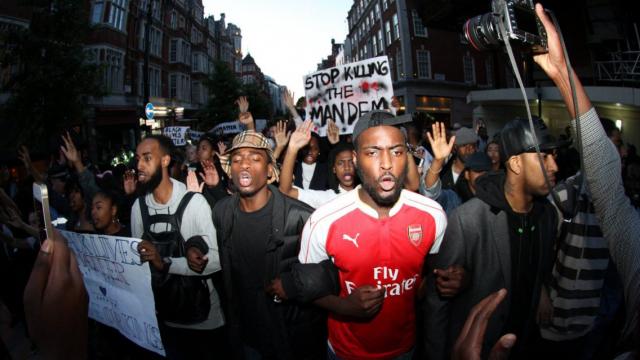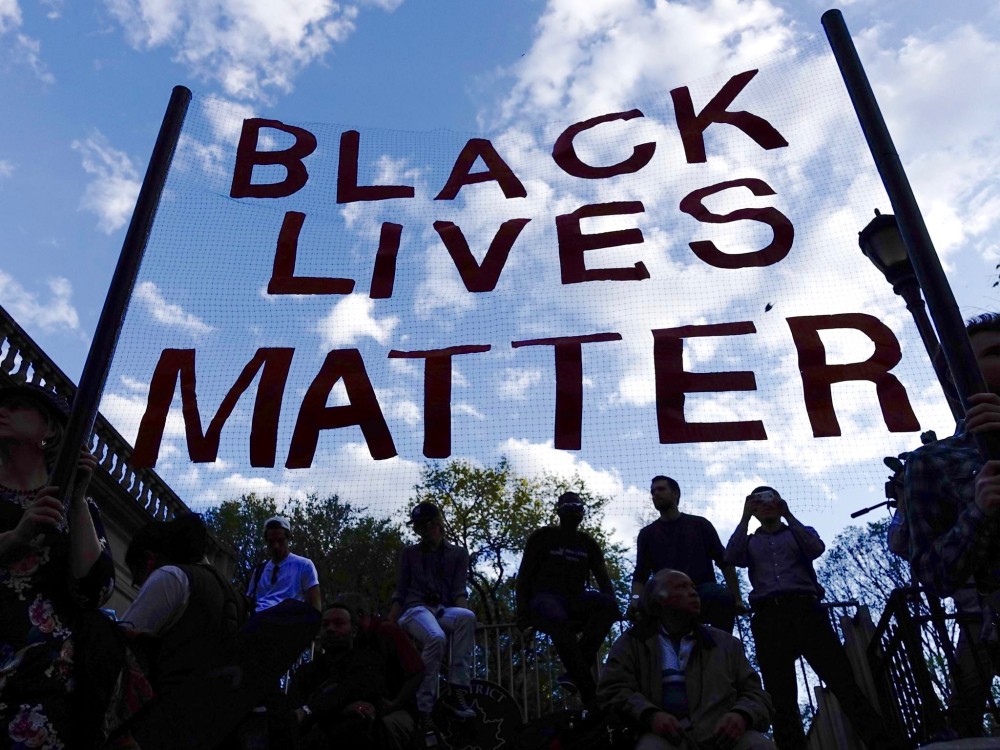
Early last month, Black Lives Matter protesters across the U.K. laid down in the road to obstruct traffic, including motorways leading to main airports. The reaction from much of the media and general public was one of bafflement and disdain. Wasn’t Black Lives Matter a U.S. problem – one in which cops carry guns and black lives really are in danger? As Britain has since discovered, the movement is bigger and broader than many initially believed.
Clive Henry is a U.K. Black Lives Matter organizer based in Nottingham, the scene of one of the August protests. “The mainstream media just doesn’t cover [black oppression] here the way it does in the U.S.,” he told Occupy.com.
“There’s this idea that Black Lives Matter activists in the U.K. are just jumping on a bandwagon and campaigning about a problem that doesn’t exist, but it really does exist. There’s a lot of prejudiced treatment of black youth, black workers, black people in custody in the U.K.”
Even without the use of guns, said Henry, police in the U.K can still wreck lives. “If you’re a black male and you walk down the street in a hooded top, you are very likely to get targeted by the police, even if you’re just minding your own business," he added. "It’s very difficult to live in Britain as a black person on a daily basis. There have been over 1,500 cases of black deaths in police custody since 1990. A film about these deaths, Injustice, was actually banned for a while.”
Not one of these deaths has ever resulted in the arrest of a police officer or prison guard.
Perhaps the most high-profile case happened in 2011, when 29-year-old Mark Duggan was shot and killed by police in London’s Tottenham. The killing prompted investigations into police misconduct and sparked riots across London, which resulted in five deaths and large-scale looting and arson.
“After Duggan, the youth took the law into their own hands,” Henry said. “But we don’t want to live in a society that is a war zone.”
His interest in the Black Lives Matter movement originally came from his own personal experience – in this case, with an employment tribunal. “I was a victim of firsthand direct racism from my employer. I took them all the way up to the European court,” he said. But Henry lost his case, and “the way the legal system treated me made me feel as if my life didn’t mean anything.”
Dr. Kehinde Andrews, an associate professor of sociology at Birmingham City University, founder of the Organisation of Black Unity and co-chair of the [Black Studies Association]http://www.blackstudies.org.uk/), said there were sharp comparisons to draw between the BLM movements in the U.K. and America.
“I’d say America is a more extreme version of Britain in terms of racism,” he told Occupy.com. “We have the same problems, they’re just worse in the States. For instance, black people are three times more likely to be killed by the police in America. But that’s because the police don’t carry guns here, which is one of the main reasons why people say that BLM doesn’t matter as much here.”
Andrews’s fear is that this may change, however. “Calls for more armed officers to tackle terrorism could easily bring us closer to the way things are in America,” he warned. At their core, the movements mirror one another.
“Young black people in the U.K. have exactly the same problems as young black Americans – if you look at educational attainment, if you look at the school-to-prison pipeline, if you look at unemployment rates. Young black men in the U.K. are just as likely to be stopped by the police as young African-American men,” he added, predicting U.K. Black Lives Matter could escalate faster than some anticipated.
“Thousands of people came out in Birmingham, in Manchester, in Nottingham and in Liverpool in protest. I see continued disruptions. Black Lives Matter is also trying to connect with other groups such as those campaigning about deaths in custody, to join forces [with them].”
Emma Dabiri, a teaching fellow at London’s School of Oriental and African Studies, has written extensively about the Black Lives Matter movement in the U.K. press. Speaking recently with Occupy.com, after leading an all-female round table discussion of Black Lives Matter with the fashion magazine Wonderland, Dabiri said:
“It’s clear to see the reach the movement is having when we can speak about these matters on a platform such as this. We discussed the differences between the U.S. and the U.K., what is needed in moving forward and what type of society it is in which we would actually want to live. I challenged the concept of achieving ‘equality,’ asking how equality can ever be achieved in a neoliberal system which not only requires, but which deepens, inequality in its unremitting expansion.
“I think anti-blackness in the U.K. is more pernicious than in the U.S. and in fact might even be [considered] more sophisticated for its stealth-like nature,” Dabiri concluded. “There is definitely a need for black organizing in the U.K. but it very much has to be adapted and responsive to the particular ways in which anti-blackness manifests in the U.K. context.”
3 WAYS TO SHOW YOUR SUPPORT
- Log in to post comments















